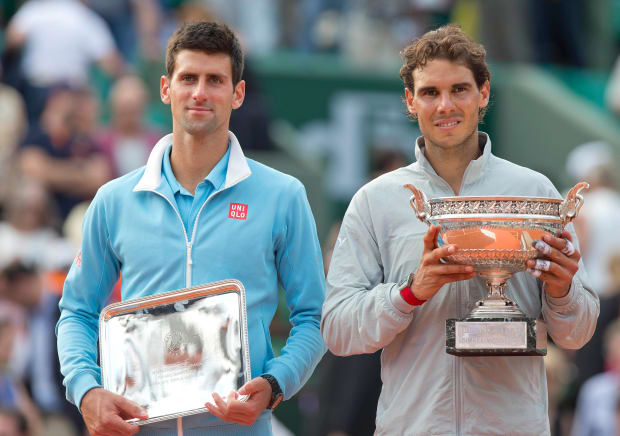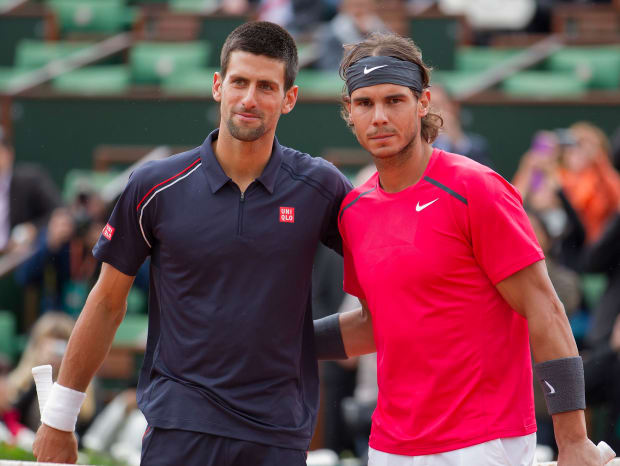The most textured rivalry in men’s tennis has crossed the globe and encompassed all kinds of circumstances. Tuesday’s 59th meeting will be no different.
PARIS—In 2006, Rafael Nadal entered his quarterfinal match as the defending French Open champion after celebrating his 20th birthday a few days prior. His opponent: 19-year-old Novak Djokovic. The match wasn’t especially memorable. Nadal brought his singular blend of intensity and left-handed lasers and won the first two sets 6-4, 6-4, before Djokovic retired.
Even the most prescient of tennis fans would never have guessed that match would be the first salvo in a rivalry spanning more than 15 years between two players likely to win more major men’s singles titles than any other in history.
On Tuesday evening here, fans will get what they came for—a quarterfinal match discerning observers had predicted as soon as the draw came out. Nadal versus Djokovic on the big court.

Susan Mullane/USA TODAY Sports
They will meet for the 59th time and … and let’s pause here. Bjorn Borg and John McEnroe—an A-list sports rivalry—played against each other 14 times. Nadal and Djokovic have faced off more than four times that. Yes, some of that is owed to longevity. Djokovic is now 35. Nadal turns 36 on Friday. But it also owed to the ritual, set-it-and-forget-it excellence of the best two players over the past decade.
Nadal and Djokovic. Djokovic and Nadal. The most textured rivalry in men’s tennis has crossed the globe and encompassed all kinds of circumstances. Seventeen of their 58 matches have come in majors, nine of those in finals. Each has beaten the other on every surface. They have played each other at least once a year since 2006. Barely five years after Djokovic couldn’t complete that first encounter in Paris, he had the durability to take down Nadal in an Australian Open final that spanned nearly six hours. After Nadal won five of the first six encounters, Djokovic stormed back. The current head-to-head: Djokovic 30, Nadal 28.
Which brings us to Tuesday. To traffic in understatement, the stakes are considerably higher than their first assignments more than a decade and a half ago. Whenever they play in a major, there is a potential two-major swing in the offing. If Djokovic wins, he is two matches from tying Nadal with 21 majors. If Nadal wins, he is two matches from taking a two-major lead, 22-20, over Djokovic and Roger Federer.
Their previous match was here a year ago, when Djokovic beat Nadal in a spellbinding semifinal match that ousted the 13-time French Open champion. Djokovic went on to win the title, his second in Paris and 19th career Grand Slam title. He picked up No. 20 a month later at Wimbledon, tying Nadal and Federer.
Then in January, Djokovic ventured to Australia to play the major he has dominated almost as thoroughly as Nadal has dominated at Roland Garros. Djokovic, though, was effectively deported, while Nadal won the title for the second time and surged ahead in the majors derby.

Susan Mullane/USA TODAY Sports
For all the data points and context, Tuesday’s encounter is, remarkably, a pick ‘em. A month ago, Djokovic had won zero titles for the year and was still shaking off tennis’ equivalent of ring rust. He has since snapped back into form and hasn’t lost a set in his past eight matches. He has looked every bit the worthy defending champion thus far in Paris, scarcely tested in four matches.
For Nadal, his track record in Paris is less a stat than a laugh line. His career record at Roland Garros heading in: 109-3. He is the winner of the previous major. Despite Nadal’s loss last year, his Roland Garros record against Djokovic is still 7-2 and he leads the rivalry on clay (19-8). On the other hand, there is Nadal’s foot, a constant concern hovering over this event and his entire career. While Djokovic hasn’t been tested, Nadal is coming off a five-set, survive-and-advance win against Felix Auger-Aliassime.
If we’re looking for any indications, the most critical one was made Monday by the schedulers. This will be a night match, a decided disadvantage to Nadal, who wants the ball jumping off the clay. Keep an eye, too, on the first set. In 50 of their previous 58 matches, the winner of the first set has prevailed.
But it’s a testament to both players that there is no clear-cut favorite. As Nadal put it to me Sunday: “The only thing I can say is I know how the situation is at this stage of my career. I always have on my mind that this may be my last match in my tennis career, on this amazing court, so I always try to fight and enjoy as much as I can.”
The 2022 Djokovic-Nadal quarterfinal here will be appreciated in a way the 2006 quarterfinal was not. We take notice of time as it flees.